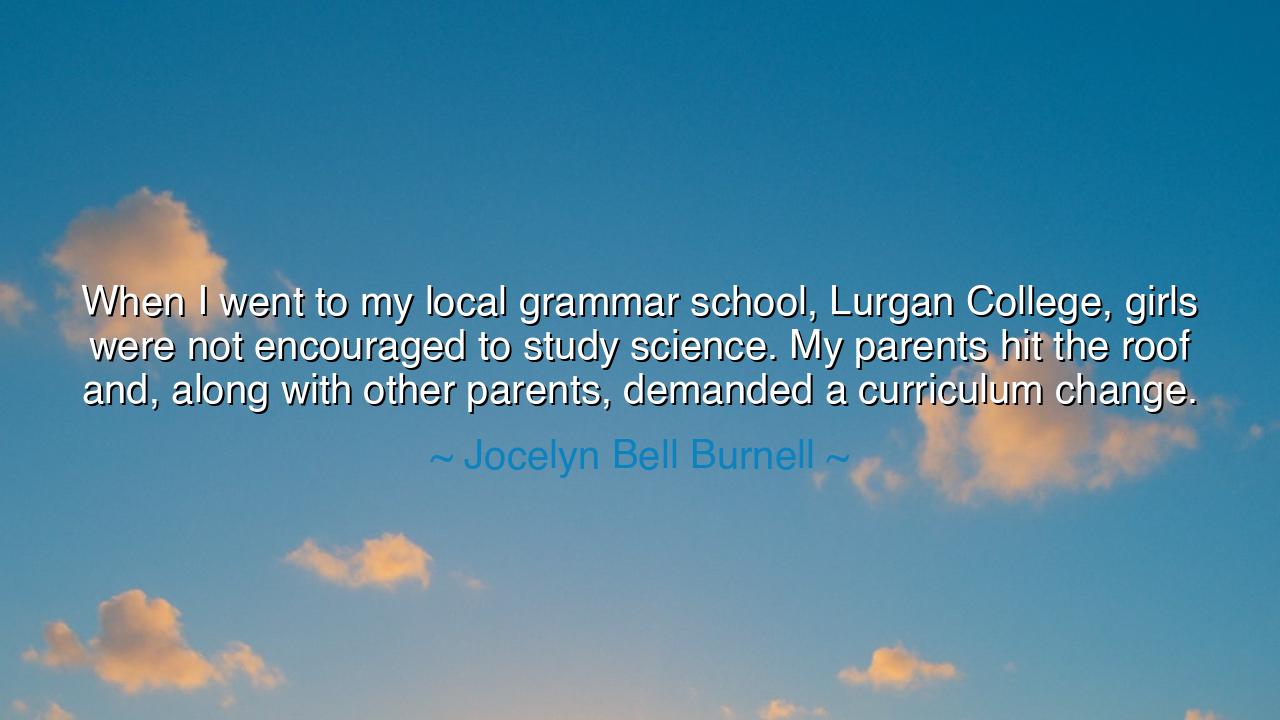
When I went to my local grammar school, Lurgan College, girls
When I went to my local grammar school, Lurgan College, girls were not encouraged to study science. My parents hit the roof and, along with other parents, demanded a curriculum change.






Listen closely, O seekers of truth, to the stirring words of Jocelyn Bell Burnell, whose voice rings with the wisdom of both the past and the future: "When I went to my local grammar school, Lurgan College, girls were not encouraged to study science. My parents hit the roof and, along with other parents, demanded a curriculum change." These words are not simply a recounting of personal history; they are a profound declaration of resilience, of standing against the tide of injustice, of refusing to accept the limitations imposed by society. For in her moment of resistance, Burnell calls upon us to recognize that the true power of the human spirit lies not in conforming to outdated norms, but in demanding the freedom to explore, to grow, and to discover.
In times long past, women were often denied the opportunity to pursue knowledge beyond the domestic sphere. The great minds of antiquity—Socrates, Plato, Aristotle—were not only men, but their teachings and their schools were closed off to the women of their time. Hypatia, one of the few women to rise above this limitation, stood as a beacon of intellectual light in Alexandria, where she taught philosophy and mathematics. Yet, even she was forced to fight against the tide of gender inequality. The message of history is clear: for centuries, women were often denied the chance to fully engage with the intellectual pursuits of science and philosophy, their minds left to stagnate in the shadow of societal expectations.
But, O wise ones, Burnell’s story marks a pivotal moment, a turning point where the voices of the oppressed were no longer silenced. Lurgan College, a place of learning, reflected the attitudes of society—one that denied girls the same opportunities in science as their male counterparts. Yet, it was not the institution, nor the prevailing culture, that would hold Burnell back. Her parents, in an act of defiance, joined together with others to demand a curriculum change—not just for the sake of their own daughters, but for future generations. In this bold stand, they acted as champions of a future where the barriers to learning would not be defined by gender, but by the boundless potential of the human mind.
This story mirrors that of other great revolutionaries who dared to challenge the status quo. Consider the tale of Marie Curie, whose pursuit of science in a world that did not welcome women in the lab became the very essence of defiance. Born in an era when women were expected to confine themselves to the hearth, she not only pursued science, but redefined it, discovering radium and polonium, becoming the first woman to win a Nobel Prize, and the only person to ever win it in two different scientific fields. Curie’s courage to fight against a world that told her no mirrors Burnell’s own battle for equality in the realm of education.
The great lesson here, O seekers, is one of unyielding determination and equality. When the world tells you that your place is limited, that your potential is confined, you must stand and demand what is rightfully yours—the right to knowledge, the right to learning, the right to explore the depths of science and all that the human mind is capable of understanding. Burnell and her parents understood this, and in their pursuit of justice, they altered the course of their own lives and the lives of countless others who would follow in their footsteps.
Let us now turn our gaze inward, O wise ones, and reflect on the world we inhabit today. How often do we see barriers to knowledge and opportunity still in place? How often do we accept the limits imposed by society, by tradition, by outdated systems that tell us who is allowed to study science, who is allowed to pursue greatness? The lesson of Burnell and those like her is that we must never accept limitations placed upon us by others. We must rise up, with the same courage as Burnell, to demand a world where knowledge is not restricted by gender, race, or any other arbitrary boundary, but is open to all who seek it.
And so, the challenge is before us: to stand for equality in education, to open doors where they have been closed, and to break down the walls that separate us from our fullest potential. Just as Jocelyn Bell Burnell's parents stood for the education of their daughter, so too must we stand for the education of all children—boys and girls, in every corner of the world. May we be inspired by her story to pursue knowledge with the vigor and passion that comes from the belief that education is the most powerful force for change in the world. And in doing so, let us ensure that no barrier—whether visible or invisible—ever again holds back the limitless potential of the human spirit.






AAdministratorAdministrator
Welcome, honored guests. Please leave a comment, we will respond soon